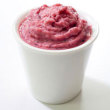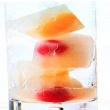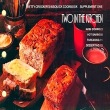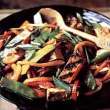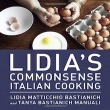Recipe: Gazpacho
Soups Answers to the Tomato Question
From: The American Institute for Cancer Research
It's the end of the summer and you really only have two choices - ratatouille or gazpacho - to cope with an overabundance of tomatoes. Unless you turn to the old-fashioned method of canning, these dishes are two of the easiest ways to get rid of large quantities of tomatoes quickly.
Ratatouille, a popular dish from the south of France, is made by slowly simmering lots of tomatoes with eggplant, onions, peppers and zucchini, all of which, if you have a vegetable garden, are probably in large supply, too.
The cold Spanish soup, gazpacho, takes the same approach. This refreshing, uncooked soup is made quickly by pur eing fresh tomatoes with other end-of-summer surplus. It's a liquid salad served in a bowl or glass, depending on the consistency.
Gazpacho comes from the Spanish word caspicias, meaning "remainders" or "worthless things." This soup, however, is far from worthless. Gazpacho's tomatoes, garlic and onions contain phytochemicals that help protect against cancer and other chronic diseases, making this chilled refresher a powerful ally.
Tomatoes, for example, especially cooked versions like juice and sauce, are a major source of lycopene, a potent antioxidant thought to reduce the risk of some cancers. (Red and pink grapefruit and watermelon also supply lycopene.) The darker the color, the higher the lycopene content.
Gazpacho is not cooked, so there's no work over a hot stove, and because it's prepared in advance, it's a perfect dish for company, giving you more time with guests.
Using raw ingredients retains a fresh flavor and nutritional content. In gazpacho, each of the many vegetables used keeps its distinct flavor. And adding cold tomato/vegetable juice unifies these flavors and enhances the taste.
Gazpacho or other cold summer soups should not be served icy cold, which dulls their flavors. Let these soups sit for a while after taking them out of the refrigerator. And taste just before serving to check if the seasonings need to be adjusted.
Gazpacho
2 cups fresh, whole plum tomatoes
2 large garlic cloves
1 1/4 cups canned tomato/vegetable juice
2 slices stale, thinly-sliced white bread crusts removed
3 generous dashes hot sauce, or to taste
Pinch cayenne pepper, or to taste
2 tsp. white wine vinegar
1 tsp. extra-virgin olive oil
Freshly ground black pepper, to taste
2/3 cup finely diced cucumber
2/3 cup finely diced green bell pepper
2/3 cup finely diced raw zucchini
2/3 cup finely diced celery
2/3 cup diced red onion
In a blender or food processor, combine the tomatoes and garlic. Pure to a coarse pulp. Add juice and blend. Tear stale bread slices into 4 pieces. Add to blender and pure to give mixture a pulpy quality. Mix in hot pepper sauce, cayenne, vinegar, oil and black pepper. Taste and adjust seasonings with hot sauce, cayenne and black pepper. Chill, covered, overnight.
Before serving, let gazpacho stand for a short time, until just pleasantly cold. Taste and check if seasonings need to be adjusted. Serve in four bowls or tall glasses. Garnish top of each serving with a generous spoonful each of diced cucumber, green pepper, zucchini, celery and onion.
Makes 4 servings.
Per serving: 103 calories, 2 g. total fat (0 g. saturated fat), 19 g. carbohydrate, 3 g. protein, 3 g. dietary fiber, 286 mg. sodium.
From: The American Institute for Cancer Research
It's the end of the summer and you really only have two choices - ratatouille or gazpacho - to cope with an overabundance of tomatoes. Unless you turn to the old-fashioned method of canning, these dishes are two of the easiest ways to get rid of large quantities of tomatoes quickly.
Ratatouille, a popular dish from the south of France, is made by slowly simmering lots of tomatoes with eggplant, onions, peppers and zucchini, all of which, if you have a vegetable garden, are probably in large supply, too.
The cold Spanish soup, gazpacho, takes the same approach. This refreshing, uncooked soup is made quickly by pur eing fresh tomatoes with other end-of-summer surplus. It's a liquid salad served in a bowl or glass, depending on the consistency.
Gazpacho comes from the Spanish word caspicias, meaning "remainders" or "worthless things." This soup, however, is far from worthless. Gazpacho's tomatoes, garlic and onions contain phytochemicals that help protect against cancer and other chronic diseases, making this chilled refresher a powerful ally.
Tomatoes, for example, especially cooked versions like juice and sauce, are a major source of lycopene, a potent antioxidant thought to reduce the risk of some cancers. (Red and pink grapefruit and watermelon also supply lycopene.) The darker the color, the higher the lycopene content.
Gazpacho is not cooked, so there's no work over a hot stove, and because it's prepared in advance, it's a perfect dish for company, giving you more time with guests.
Using raw ingredients retains a fresh flavor and nutritional content. In gazpacho, each of the many vegetables used keeps its distinct flavor. And adding cold tomato/vegetable juice unifies these flavors and enhances the taste.
Gazpacho or other cold summer soups should not be served icy cold, which dulls their flavors. Let these soups sit for a while after taking them out of the refrigerator. And taste just before serving to check if the seasonings need to be adjusted.
Gazpacho
2 cups fresh, whole plum tomatoes
2 large garlic cloves
1 1/4 cups canned tomato/vegetable juice
2 slices stale, thinly-sliced white bread crusts removed
3 generous dashes hot sauce, or to taste
Pinch cayenne pepper, or to taste
2 tsp. white wine vinegar
1 tsp. extra-virgin olive oil
Freshly ground black pepper, to taste
2/3 cup finely diced cucumber
2/3 cup finely diced green bell pepper
2/3 cup finely diced raw zucchini
2/3 cup finely diced celery
2/3 cup diced red onion
In a blender or food processor, combine the tomatoes and garlic. Pure to a coarse pulp. Add juice and blend. Tear stale bread slices into 4 pieces. Add to blender and pure to give mixture a pulpy quality. Mix in hot pepper sauce, cayenne, vinegar, oil and black pepper. Taste and adjust seasonings with hot sauce, cayenne and black pepper. Chill, covered, overnight.
Before serving, let gazpacho stand for a short time, until just pleasantly cold. Taste and check if seasonings need to be adjusted. Serve in four bowls or tall glasses. Garnish top of each serving with a generous spoonful each of diced cucumber, green pepper, zucchini, celery and onion.
Makes 4 servings.
Per serving: 103 calories, 2 g. total fat (0 g. saturated fat), 19 g. carbohydrate, 3 g. protein, 3 g. dietary fiber, 286 mg. sodium.
MsgID: 3112018
Shared by: Betsy at Recipelink.com
In reply to: Recipe: Assorted Recipes (22)
Board: Daily Recipe Swap at Recipelink.com
Shared by: Betsy at Recipelink.com
In reply to: Recipe: Assorted Recipes (22)
Board: Daily Recipe Swap at Recipelink.com
- Read Replies (22)
- Post Reply
- Post New
- Save to Recipe Box
ADVERTISEMENT
Random Recipes from:
Soups
Soups
- Escarole Soup with Chicken and Rice (Italian)
- Wedding Soup with Mini Meatballs (using spinach and carrots)
- Chicken Gumbo and Variations (pressure cooker)
- Golden Squash Soup
- Olive Garden Toscana Soup (repost)
- Sopa De Frijoles Colorados (Red Bean Soup)
- Dal Shorva (Creamy Lentil Soup with Caramelized Onion) (food processor)
- Barley Vegetable Soup (with or without Miso)
- San Luis Green Chile Soup
- Lentil Soup (Veg-All, 1992)
UPLOAD AN IMAGE
Allowed file types: .gif .png .jpg .jpeg
Allowed file types: .gif .png .jpg .jpeg
POST A REPLY
Post a Request - Answer a Question
Share a Recipe
Thank You To All Who Contribute
Post a Request - Answer a Question
Share a Recipe
Thank You To All Who Contribute
POST A NEW MESSAGE
Post a Request - Answer a Question
Share a Recipe
Thank You To All Who Contribute
Post a Request - Answer a Question
Share a Recipe
Thank You To All Who Contribute

